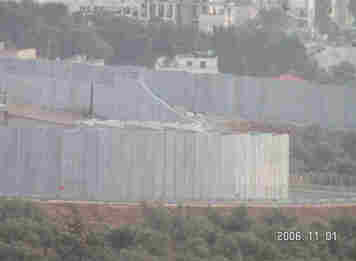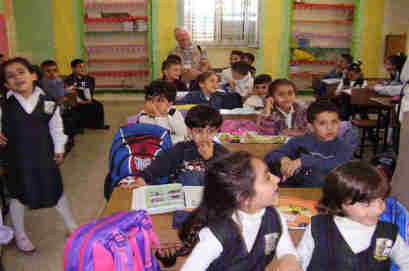Tony Ockendon, an Advisor to CNT, writes:
I have had the privilege of attending Midnight Mass in Bethlehem three times. The first was in 1947 when I was a 20 year old officer in the British Army of occupation at the time. The second was in 2002, when I was on one of my trips relating to the Latin Patriarchal schools. The third visit was the Christmas of 2006, when seven of us spent 10 days in the Holy Land.
Our various activities were memorable but I will concentrate here on Christmas Eve in Bethlehem. We had supper in an Arabic tented restaurant named Shepherds Fields Valley before wending our way to the Church of the Nativity. This meal was shared with a family I have known for some years and who have suffered many hardships; for instance their modern house, with others in their street, was shelled without cause in 2001 and following this trauma, mother, father and three young children were forced to live in one room for eight months. For the past six months there has been no income in the family and this supper was a feast for them.
Just before the Mass started the Palestinian President arrived. Behind the altar were a full choir of fifty-plus voices, around 100 Franciscan monks and many bishops, priests and seminarians.  The Latin Patriarch presided in shining gold vestments. It was a sight and scene worthy of Christ’s Birthday – the The Wall around Bethlehem Mass was magnificent and the singing exquisite. The Patriarch’s homily was inevitably of a political nature, with references to the troubles within and around the Holy Land, but his message to all – the Palestinian and Israeli leaders as well as those of the international community – was one of peace, wisdom and justice. He called upon us all to “examine our conscience in light of the goodness God has put in each of us, in all of us, political leaders, adversaries on both sides, militias, those who are classified as extremists and terrorists, those who claim to speak in the name of God, and all those who say they want peace. All are invited to examine their conscience in order to enter a new path that puts an end to bloodshed, death and, in these days, to new internal quarrels. In this way, peace will come about and all human beings will regain their dignity without any additional blood being shed”. And he implored all Christians around the world to pray “in order to bring a new period in our history”.
The Latin Patriarch presided in shining gold vestments. It was a sight and scene worthy of Christ’s Birthday – the The Wall around Bethlehem Mass was magnificent and the singing exquisite. The Patriarch’s homily was inevitably of a political nature, with references to the troubles within and around the Holy Land, but his message to all – the Palestinian and Israeli leaders as well as those of the international community – was one of peace, wisdom and justice. He called upon us all to “examine our conscience in light of the goodness God has put in each of us, in all of us, political leaders, adversaries on both sides, militias, those who are classified as extremists and terrorists, those who claim to speak in the name of God, and all those who say they want peace. All are invited to examine their conscience in order to enter a new path that puts an end to bloodshed, death and, in these days, to new internal quarrels. In this way, peace will come about and all human beings will regain their dignity without any additional blood being shed”. And he implored all Christians around the world to pray “in order to bring a new period in our history”.
On reflection, the Mass itself was as spiritually uplifting as on the two previous occasions but the traumas and hassles surrounding it made one feel it is no longer an experience for more mature and less energetic folk. But we all felt quite strongly afterwards that any discomfort we experienced was nothing compared to the daily suffering and privation affecting the Palestinians. It is a humbling experience to be among them and with them and yet it is not disheartening. Their hardship seems to provide them with a faith and strength to be respected and admired.

Palestinian children in school
This was my sixteenth visit to the Holy Land in six years, all of that time within the period of the current intifada. I came away this time with more feelings of sadness and pessimism than ever before. I think it is the monstrous wall that causes the most anger and depression. However there is one thing particularly that makes me go back as frequently as I can – the children who are a joy to behold and just being there with them raises hopes and gives every incentive to help them and their families. For those who have never visited, I beg you to go – you will not be disappointed and you will definitely want to return. For those who have been already, please go back as often as you can.
Above all, these oppressed and deprived peoples desperately need our prayers and the Latin Patriarch’s plea for prayer should not be ignored. Surely it is not too much to ask of every Christian to say a prayer daily for their kindred spirits in the Holy Land.